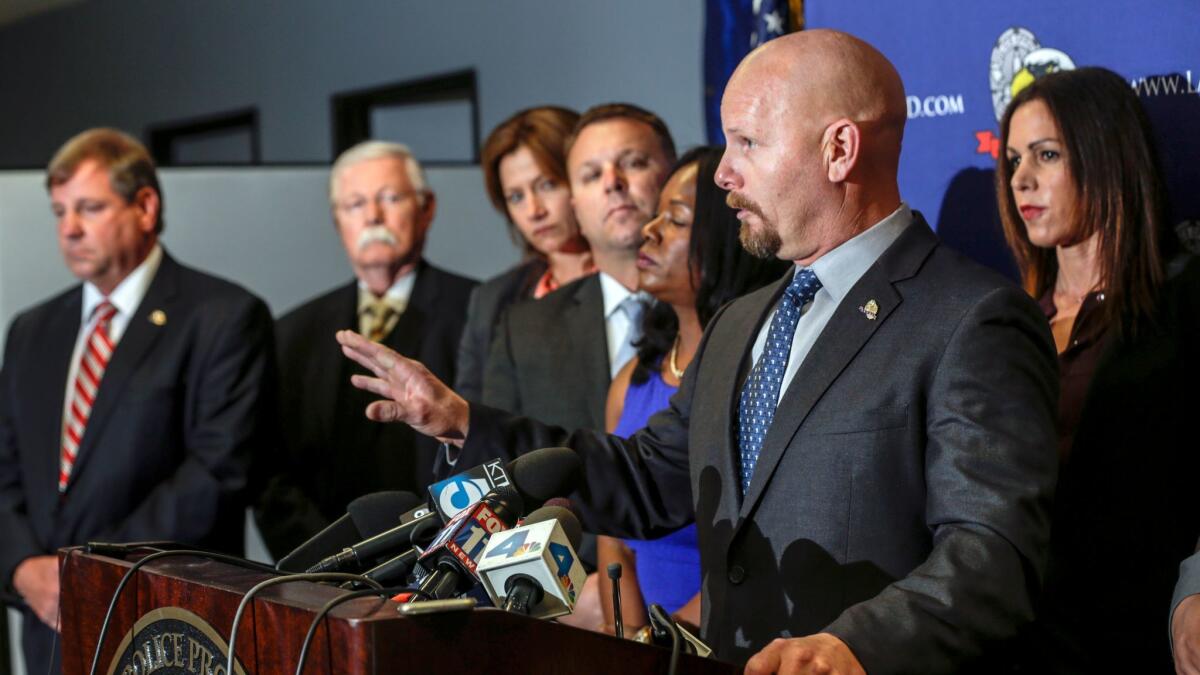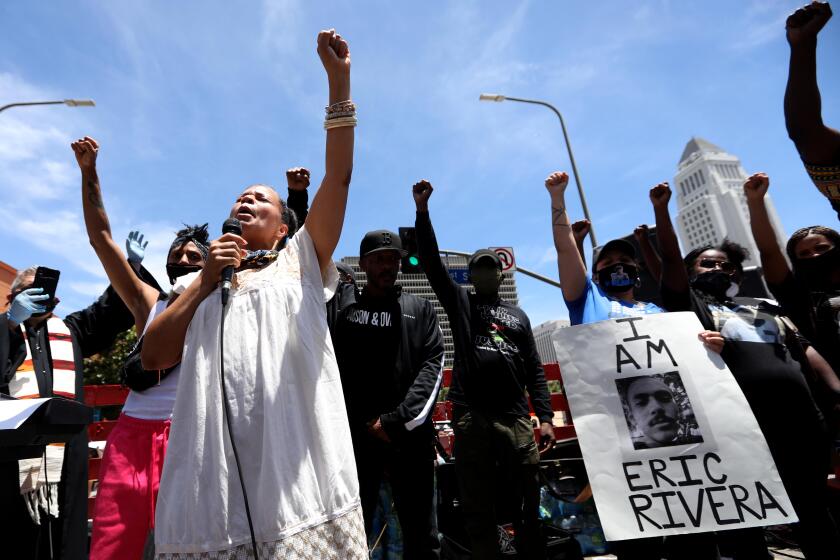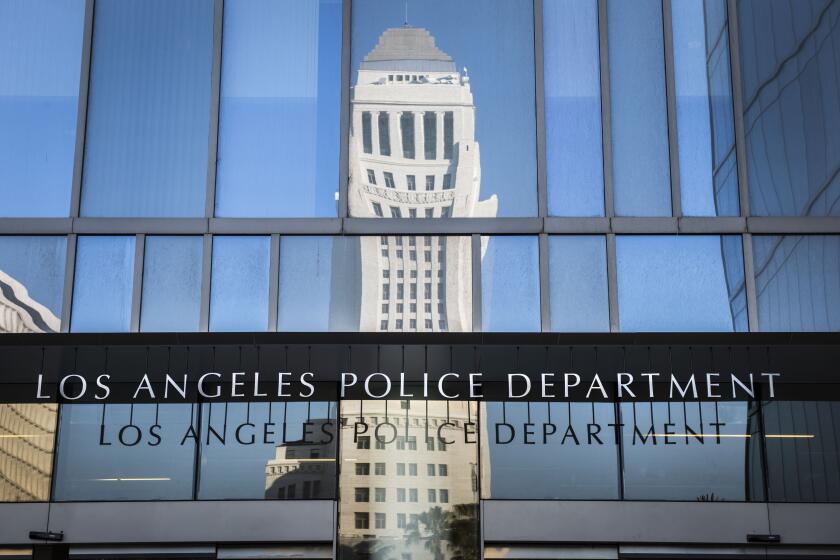‘He is our pit bull’: LAPD union boss embodies force’s troubled past as he touts reform

- Share via
The full-page ad in the Los Angeles Times and two other California newspapers seemed like an olive branch from three California police unions to thousands of people marching in the streets for police reform.
“No words can convey our collective disgust and sorrow for the murder of George Floyd,” read the advertisement. The ad called Floyd’s death a murder — a rarity for law enforcement organizations — but it also advocated an early warning system to find cops in need of retraining, supported a national database to track officers fired for gross misconduct and backed “a publicly accessible use-of-force analysis website.”
But on the same day, the most outspoken leader of L.A.’s 9,900-member police union hit his followers with a much different message.
“The CHIEF! Never sell out and back the troops!” said a Facebook post by Los Angeles Police Protective League board member Jamie McBride. The message accompanied a video of Daryl F. Gates, a former LAPD chief who ran a department plagued by excessive force and brutal relations with communities of color.
That kind of defiant pose has become a trademark for McBride over a 30-year career in the Los Angeles Police Department and six years on the board of the powerful union, which uses campaign donations to influence city elections. The Police Protective League puts McBride in front of the news media to signal that rank-and-file officers have had enough of the city’s left-leaning political leadership.
The veteran detective exudes the swagger and tribal brio of the old-school LAPD. He was a street cop with a disproportionate number of on-duty shootings and an investigator who fought management discipline (including his own) and won, and he remains a sometime actor who plays street thugs and tough cops in movies and on television.
His frequent and public Facebook posts yearn for a bygone era when the LAPD wasn’t under attack by what old-timers view as a cadre of timid chiefs, desk-bound geeks and opportunistic politicians.
With Melina Abdullah and Patrisse Cullors playing key roles, Black Lives Matter has transformed from a small but passionate movement into a cultural and political phenomenon.
McBride said via email that he grew up a fan of “Adam-12,” a TV police drama about two LAPD patrol officers who are paragons of rectitude. “I wanted to help those who most needed it,” McBride said. He later won election to the union board to make his profession better, he said, and “to protect, promote and improve wages, benefits [and] the working conditions of our members.”
Late in 2018, McBride posted a video on Facebook (with snippets from a reality TV show) showing Black and Latino suspects being body-slammed, stunned with Tasers and chased down by LAPD officers.
It features multiple corpses and streets stained with blood. The video also shows officers breaking up a fight and tending to wounded citizens. McBride’s headline for the video: “That good ol days.”
“What you see in this video is a joy in search-and-destroy policing. … It’s not about protection. It’s not about safety. It’s warrior enforcement,” said Connie Rice, a civil rights lawyer who has worked with the department on reform measures.
Of officers like McBride, Rice added: “That’s the kind of policing they enjoy. That’s what they live for. … What the protesters are saying is: ‘Time’s up for that. It’s over.’ The consent of the governed for that kind of policing is done.”
McBride said that the video shows an earlier era of policing but that he acknowledges a need for change. “We as a department have instituted hundreds of reforms, yet there is more we can do,” he said.
He described the video as showing “the physical aspects of policing and depict[s] officers reacting to the actions of those they encounter,” as well as instances of caring. He suggested that multiple surgeries prevent him from serving the community, work he said he misses.
Rice and other longtime observers believe the LAPD has made some progress from what might have been its most belligerent era, beginning with the crack cocaine crackdown of the 1980s and extending into the 1990s Rampart Division scandal, in which anti-gang officers framed civilians and falsified testimony in reports.
But reform advocates say that the genetic code of LAPD and other departments still perpetuates an us-versus-them policing culture.
Some critics demand the “defunding” of police, a movement that ranges from those pushing an outright elimination of armed officers to those who would keep police but tilt municipal budgets toward social services such as homeless outreach and mental health care.
With the reform fervor rising in the streets, Mayor Eric Garcetti and City Council President Nury Martinez proposed shifting as much as $150 million from the police into social services. The L.A. Police Protective League said the politicians reneged on a promise to consult with them before going public with any proposed changes.
That alleged slight distressed officers who said they already felt besieged by charges of brutality and racism. The union’s leadership met and decided to deploy McBride as the group’s most pugnacious voice against marginalization, said a source familiar with the union’s strategy.
“He is our pit bull,” the source said, “and he is going to take some hard swings at you if he has to.”
On June 5, the 51-year-old union leader stood at a lectern in front of the rest of the Police Protective League board and called Garcetti mentally “unstable.” He chastised the mayor and Martinez as hypocrites for benefiting from uniformed protective units while simultaneously moving to reduce police funding.
After leading with McBride’s iron fist, a union insider said, the group intends to follow up with the velvet glove of more moderate board members.
McBride insisted in his email that the LAPD has not gotten enough credit for what it’s already accomplished: “Officer involved shootings are at a 30-year low, community briefing videos are publicly released detailing critical incidents, and every complaint made against an officer is investigated,” he wrote. “We are headed in the right direction and know that there is more to do.”
A few days after his broadside at City Hall, McBride took on protesters. He told a podcast host that Black Lives Matter was “an anti-police hate group” and a “modern-day Black Panther type of organization.”
Like the other eight directors of the Police Protective League, McBride remains a sworn officer and receives the equivalent of his detective’s salary while representing his fellow officers. He lost a vote for president of the Police Protective League by five votes in 2016 but handily won reelection to the board in 2017.
The Venice-born cop stirs both loyalty and disdain within the ranks of the LAPD.
Reform-minded officers scoff at McBride’s ego, his frequent use of force early in his career and his apparent love of command-and-control policing. McBride’s obstreperous stance “clearly shows he is out of step with the direction the department needs to go in order to evolve to better serve the community,” said Mitzi Fierro, a onetime Police Protective League board member, now retired.
A top Police Department supervisor, who asked to remain anonymous to preserve relations with officers, called McBride “the worst public face of the LAPD.”
McBride said he had “thick skin” and wouldn’t be bothered by anonymous critics. He said he and the current board are more reform-minded than Fierro was during her time with the union.
McBride loyalists see him as the tireless champion of the average cop, in a world where they are stuck with society’s most intractable problems — homelessness, addiction and domestic violence — and blamed when interactions with police go badly. After McBride went after Garcetti, a Facebook friend cheered him on: “Get him bulldog!”
McBride joined the LAPD at age 21. He received commendations for his field work, particularly his ability to spot suspects carrying concealed weapons and to take illegal guns off the streets of South Los Angeles.
But a 2004 review by The Times found that McBride also had been involved in many more shootings, a total of six in his first 11 years on the force, than the vast majority of other officers. The story reported that McBride had been repeatedly criticized for putting himself and fellow officers at risk with careless tactics.
“I don’t have time for that ghetto gun-fighting anymore,” McBride, then 35, told The Times. “I’m getting too old for that. That’s not what I’m about.”
But, far from shrinking from his record today, the union director lists The Times’ article about shootings (along with roughly 20 film and TV credits) on the entertainment-industry database IMDb. He insists that the shootings were “deemed within policy, with the most recent occurring 19 years ago.”
He began his Hollywood moonlighting in 2002 and has worked with Tom Cruise, Jamie Foxx and other stars. His bio also lists pro wresting star “Stone Cold” Steve Austin as his half brother. But that claim is just a joke, he said.
While the city’s political leadership views any embrace of the Chief Gates-era LAPD as problematic, McBride insisted he posted the video showing Gates sharply defending officers after the Rodney King beating not as a commentary on reform efforts.
“My point,” he said, “was that our current chief and some of our current civic leaders need to start vocally supporting our police officers” who feel “pushed to the limits.”
McBride posted a series of Facebook videos in early June celebrating his fellow officers as they squared off against protesters. The videos, titled “Hold The Line,” feature rows of cops staring down shouting activists and officers posing in front of graffiti that threatens violence against “pigs.” One of McBride’s pro-police videos comes with a soundtrack, AC/DC’s “Shoot to Thrill.”
McBride’s daughter, LAPD Officer Toni McBride, also appears in the videos, smiling and decked out in full riot gear. She is also a popular figure among some gun enthusiasts, with multiple online videos showing her blasting away at targets, sometimes in a T-shirt labeled “Warrior.”
The younger McBride, who joined the force in 2017, has become another touchstone for anger by police reform activists. The complaints began early on the evening of April 22, when Toni McBride was patrolling South Los Angeles.
The official police account of the incident says that after causing a traffic accident, Daniel Hernandez, 38, advanced at McBride with a knife. She shot at him six times, killing him.
Officials and police reform activists in Los Angeles disagree on how to reform the L.A. Police Department.
An investigation by the LAPD is pending while Hernandez’s family members have filed two federal lawsuits, accusing McBride and the LAPD of excessive force and wrongful death. The family has also said it is concerned that the investigation won’t be fair because of the elder McBride’s clout inside the department, a claim the department rejects.
Hernandez’s family wonders why Toni McBride couldn’t have avoided using deadly force.
“They will take hours to de-escalate these things in other parts of the city, so why can’t they do that in South L.A.?” asked Hernandez’s sister, Marina Vergara.
Larry Hanna, an attorney for Toni McBride, said that she, like other police, does not like to use deadly force and is saddened by Hernandez’s death. Hanna said the younger McBride had to shoot to defend herself, and many civilians on the scene, as Hernandez ignored repeated warnings to stop and drop his knife.
In an appearance on the “Hidden Truth” podcast this month, Jamie McBride decried the lawlessness of protesters following the police killing of Floyd in Minneapolis. He said only a few Black residents don’t like the LAPD. “They love the police,” he told the host, Jim Breslo. “They want to live in an area free of crime.”
The union and McBride have previously argued that the LAPD has already adopted many reforms that make officers’ actions more transparent to the public, like the use of body cameras and the release of after-action reports on shootings within 45 days.
One official said the police union would support expanded investment in mental health workers, homeless outreach aides, substance-abuse prevention experts and others to allow officers to focus on other priorities. But the group will not abide taking money from the department’s $1.8-billion budget to pay for those services. The department needs to be improved, not diminished, the union says.
But McBride’s presence as a leader reinforces the feeling of some activists that the LAPD can’t be reformed and must be disbanded.
“If this is who is elected to lead the Protective League, what does that say about the entire police force?” asked Melina Abdullah, co-founder of Black Lives Matter Los Angeles. “That tells me we can’t just see modest reform, that the whole department is rotten. How can you build trust when this is the person doing the talking?”
Times staff writer James Queally contributed to this report.
More to Read
Sign up for Essential California
The most important California stories and recommendations in your inbox every morning.
You may occasionally receive promotional content from the Los Angeles Times.













